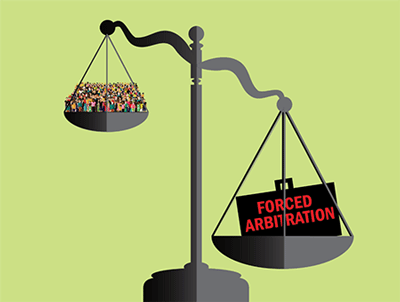What Do Proposed Changes to Forced Arbitration and the SCRA Mean to Lenders?

Congress recently announced plans to re-introduce a bill to ban the use of forced arbitration in cases involving the Servicemembers Civil Relief Act. This move may prove to have a serious impact on lenders.
The bill, known as the Justice for Servicemembers Act, has been kicking around Congress for a couple of years. Reps. David Cicilline, D-R.I., and Mark Takano, D-Calif., have plans to re-introduce it. The act would also ban forced arbitration in matters regarding the Uniformed Service Employment and Reemployment Rights Act.
As it stands, USERRA, passed in 1994, works to protect servicemembers whose employers refuse to give them their jobs back when they return from a deployment. However, in practice, many large corporations require employees to sign a contract that prevents them from taking these types of cases to court. Instead, they must agree to binding arbitration.

Arbitration is generally perceived (rightly or wrongly) to be more favorable to corporations. One reason is because monetary awards are often smaller, and cases are unappealable. Further, people who bring matters to arbitration are often prevented from discussing their cases in public.
Forced Arbitration and the SCRA
Among other provisions, the SCRA prevents lenders from repossessing the vehicles of servicemembers called to active duty without a court order.
Lenders are also required to lower interest payments on loans taken out before the start date of active duty to 6 percent if the servicemember requests it. But there have been violations of this provision over the years, some resulting in settlements and judgments against lenders that reach the tens of millions of dollars. Many settlement agreements with the Department of Justice result in the lenders reviewing (“scrubbing”) their borrower list to identify active servicemembers and proactively reducing the interest rate without waiting for a request from the servicemember.
However, as a matter of course, many lenders include binding arbitration in their contracts, preventing the servicemembers from taking these matters to court. A change to this law could mean a financial sea change for lenders who have been using a binding arbitration clause in their contracts.
What Forced Arbitration Changes Would Mean to Lenders
A law banning this practice would mean any servicemember would be free to file suit against any lender, rather than being forced into arbitration. This would allow them to collect restitution and possibly an award for damages beyond the base costs.
Even more significant would be the monumental legal costs for lenders who would have to continually defend themselves in court.
Turn to SCRACVS for Military Status Verifications
If this law passes, the best way for lenders to cover themselves is to stay complaint with the SCRA. The Servicemembers Civil Relief Act Centralized Verification Service can help. Rely on the SCRACVS for all your military status verifications. With these in hand, you will know for sure which of your customers is in the military.

